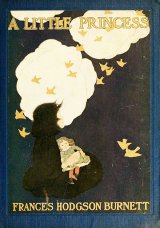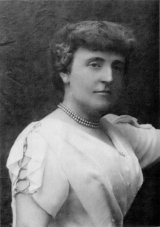A Little Princess Page #9
A Little Princess is a children's novel by Frances Hodgson Burnett, first published as a book in 1905.
Whatsoever story she had begun to tell, Lottie would, no doubt, have stopped crying, and been fascinated into listening; but there was no denying that this story was prettier than most others. She dragged herself close to Sara, and drank in every word until the end came--far too soon. When it did come, she was so sorry that she put up her lip ominously. "I want to go there," she cried. "I--haven't any mamma in this school." Sara saw the danger signal, and came out of her dream. She took hold of the chubby hand and pulled her close to her side with a coaxing little laugh. "I will be your mamma," she said. "We will play that you are my little girl. And Emily shall be your sister." Lottie's dimples all began to show themselves. "Shall she?" she said. "Yes," answered Sara, jumping to her feet. "Let us go and tell her. And then I will wash your face and brush your hair." To which Lottie agreed quite cheerfully, and trotted out of the room and upstairs with her, without seeming even to remember that the whole of the last hour's tragedy had been caused by the fact that she had refused to be washed and brushed for lunch and Miss Minchin had been called in to use her majestic authority. And from that time Sara was an adopted mother. 5 Becky Of course the greatest power Sara possessed and the one which gained her even more followers than her luxuries and the fact that she was "the show pupil," the power that Lavinia and certain other girls were most envious of, and at the same time most fascinated by in spite of themselves, was her power of telling stories and of making everything she talked about seem like a story, whether it was one or not. Anyone who has been at school with a teller of stories knows what the wonder means--how he or she is followed about and besought in a whisper to relate romances; how groups gather round and hang on the outskirts of the favored party in the hope of being allowed to join in and listen. Sara not only could tell stories, but she adored telling them. When she sat or stood in the midst of a circle and began to invent wonderful things, her green eyes grew big and shining, her cheeks flushed, and, without knowing that she was doing it, she began to act and made what she told lovely or alarming by the raising or dropping of her voice, the bend and sway of her slim body, and the dramatic movement of her hands. She forgot that she was talking to listening children; she saw and lived with the fairy folk, or the kings and queens and beautiful ladies, whose adventures she was narrating. Sometimes when she had finished her story, she was quite out of breath with excitement, and would lay her hand on her thin, little, quick-rising chest, and half laugh as if at herself. "When I am telling it," she would say, "it doesn't seem as if it was only made up. It seems more real than you are--more real than the schoolroom. I feel as if I were all the people in the story--one after the other. It is queer." She had been at Miss Minchin's school about two years when, one foggy winter's afternoon, as she was getting out of her carriage, comfortably wrapped up in her warmest velvets and furs and looking very much grander than she knew, she caught sight, as she crossed the pavement, of a dingy little figure standing on the area steps, and stretching its neck so that its wide-open eyes might peer at her through the railings. Something in the eagerness and timidity of the smudgy face made her look at it, and when she looked she smiled because it was her way to smile at people. But the owner of the smudgy face and the wide-open eyes evidently was afraid that she ought not to have been caught looking at pupils of importance. She dodged out of sight like a jack-in-the-box and scurried back into the kitchen, disappearing so suddenly that if she had not been such a poor little forlorn thing, Sara would have laughed in spite of herself. That very evening, as Sara was sitting in the midst of a group of listeners in a corner of the schoolroom telling one of her stories, the very same figure timidly entered the room, carrying a coal box much too heavy for her, and knelt down upon the hearth rug to replenish the fire and sweep up the ashes. She was cleaner than she had been when she peeped through the area railings, but she looked just as frightened. She was evidently afraid to look at the children or seem to be listening. She put on pieces of coal cautiously with her fingers so that she might make no disturbing noise, and she swept about the fire irons very softly. But Sara saw in two minutes that she was deeply interested in what was going on, and that she was doing her work slowly in the hope of catching a word here and there. And realizing this, she raised her voice and spoke more clearly. "The Mermaids swam softly about in the crystal-green water, and dragged after them a fishing-net woven of deep-sea pearls," she said. "The Princess sat on the white rock and watched them." It was a wonderful story about a princess who was loved by a Prince Merman, and went to live with him in shining caves under the sea. The small drudge before the grate swept the hearth once and then swept it again. Having done it twice, she did it three times; and, as she was doing it the third time, the sound of the story so lured her to listen that she fell under the spell and actually forgot that she had no right to listen at all, and also forgot everything else. She sat down upon her heels as she knelt on the hearth rug, and the brush hung idly in her fingers. The voice of the storyteller went on and drew her with it into winding grottos under the sea, glowing with soft, clear blue light, and paved with pure golden sands. Strange sea flowers and grasses waved about her, and far away faint singing and music echoed. The hearth brush fell from the work-roughened hand, and Lavinia Herbert looked round. "That girl has been listening," she said. The culprit snatched up her brush, and scrambled to her feet. She caught at the coal box and simply scuttled out of the room like a frightened rabbit. Sara felt rather hot-tempered. "I knew she was listening," she said. "Why shouldn't she?" Lavinia tossed her head with great elegance. "Well," she remarked, "I do not know whether your mamma would like you to tell stories to servant girls, but I know MY mamma wouldn't like ME to do it." "My mamma!" said Sara, looking odd. "I don't believe she would mind in the least. She knows that stories belong to everybody."
Translation
Translate and read this book in other languages:
Select another language:
- - Select -
- 简体中文 (Chinese - Simplified)
- 繁體中文 (Chinese - Traditional)
- Español (Spanish)
- Esperanto (Esperanto)
- 日本語 (Japanese)
- Português (Portuguese)
- Deutsch (German)
- العربية (Arabic)
- Français (French)
- Русский (Russian)
- ಕನ್ನಡ (Kannada)
- 한국어 (Korean)
- עברית (Hebrew)
- Gaeilge (Irish)
- Українська (Ukrainian)
- اردو (Urdu)
- Magyar (Hungarian)
- मानक हिन्दी (Hindi)
- Indonesia (Indonesian)
- Italiano (Italian)
- தமிழ் (Tamil)
- Türkçe (Turkish)
- తెలుగు (Telugu)
- ภาษาไทย (Thai)
- Tiếng Việt (Vietnamese)
- Čeština (Czech)
- Polski (Polish)
- Bahasa Indonesia (Indonesian)
- Românește (Romanian)
- Nederlands (Dutch)
- Ελληνικά (Greek)
- Latinum (Latin)
- Svenska (Swedish)
- Dansk (Danish)
- Suomi (Finnish)
- فارسی (Persian)
- ייִדיש (Yiddish)
- հայերեն (Armenian)
- Norsk (Norwegian)
- English (English)
Citation
Use the citation below to add this book to your bibliography:
Style:MLAChicagoAPA
"A Little Princess Books." Literature.com. STANDS4 LLC, 2025. Web. 9 Jan. 2025. <https://www.literature.com/book/a_little_princess_31>.




Discuss this A Little Princess book with the community:
Report Comment
We're doing our best to make sure our content is useful, accurate and safe.
If by any chance you spot an inappropriate comment while navigating through our website please use this form to let us know, and we'll take care of it shortly.
Attachment
You need to be logged in to favorite.
Log In